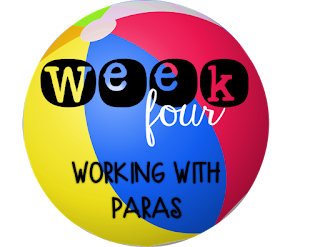Welcome to Week 4 of the Special Education Back to School Blog Hop! We have covered scheduling, how to set up your classroom, and back to school forms. This week we are talking about one of the most important and (maybe) difficult part of being a special educator- working with paraprofessionals.

Many new sped teachers can find it difficult to not only be in charge of a caseload, but also other adults. Directing other adults who may be older than you in a job that is new to you is tricky. I am very lucky to have paras in my classroom whom I genuinely get along with. I believe that a few key things have made our working relationship, well... work.
1. Training- I invite my paras to come by school before the first day. I say "invite" because I can't require them to be on campus before their contract starts. My paras are awesome and have come each time I asked. I think they appreciate the heads up for the year. During our training we go over the basics for the year- class schedule, their individual schedule, the classroom layout, and student goals/work. We also go over our Para handbook. I use this one from Mrs. H's Resource Room. It covers the basics like chain of command and being on time, but I love that it also covers how to model appropriate participation and appropriate responses to behavior. It's not too long and it has great information. Remember, most paras don't have degrees in special education, so it is up to us to train them.
2. Clear Expectations- My paras run centers and I lay out direction for what I want them to teach. I tell them what goals they should be working on and give them materials to hit those goals. That being said, I do give them a little flexibility if the plans aren't working. I trust my paras to adjust the lesson or change up the materials if the kids just aren't going for it.
3. Organization- Nobody wants to work in a confusing or messy environment. Not knowing what you should be doing or where to find the things you need is stressful. Make sure you set your paras up with all of the tools they need to complete the job you laid out for them.
4. Communication- I have quarterly meetings with my paras. Some times we throw in an extra meeting here or there if we have a new policy, behavior procedures, etc. I create an agenda for the meeting to make sure that I cover all of the details that we need to discuss and refresh. I try to make sure that my paras know that they can come to me with concerns, ideas, or if they are starting to feel burnt out.
5. Appreciation- My classroom could not function without my paras and sometimes their jobs are less than glamorous (toileting, anyone?). Make it a point to tell them that they are a valuable part of the classroom. Everybody needs to feel appreciated and are more likely to work hard when they do. A thank you will go a long way!
How do you set up your paras for success? Check out Breezy Special Ed for some more great tips on working with paraprofessionals.



Love you comments about appreciation. That is so important especially with the types of job the paraprofessionals do and the pay they get.
ReplyDeleteGreat tips! I couldn't agree more with all of them!
ReplyDeleteLove the part about giving them some ownership and flexibility in the centers. That has worked extremely well in my program, too!
ReplyDeletePam
Mrs. P’s Specialties
Appreciation is key! We all love a pat on the back from time to time! I always make sure I take the time to thank my paras for their hard work!
ReplyDeleteThanks for the shout out, friend!
ReplyDeleteKim
Mrs. H's Resource Room
Appreciation is what it's all about! I make sure I say thank you every day as my ladies leave the room.
ReplyDeleteErin
You AUT-a Know
As a former para, it was SO nice to feel appreciated! It made the entire classroom much more cohesive and friendly :)
ReplyDelete